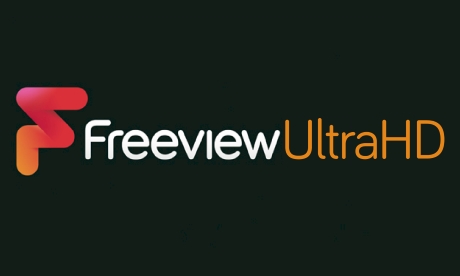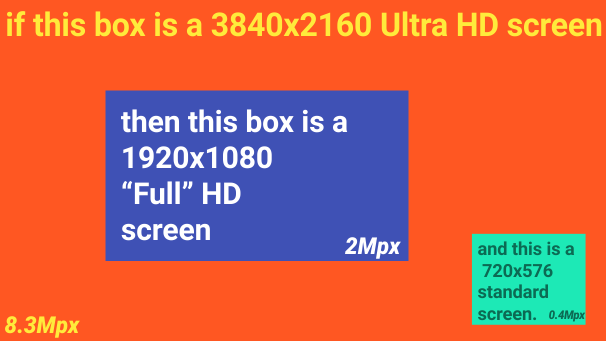Will we ever have Freeview Ultra HD or Freesat Ultra HD?

What is Ultra HD all about?
By increasing the number of picture cells (pixels) on the television screen, the overall watching experience can be enhanced.
There are five things you need to watch in Ultra HD
- A TV set that can display Ultra HD pictures;
- A receiver box that can drive a Ultra HD TV set at the full resolution and that can decode the data;
- A service (online or broadcast) that can provide enough data and
- The service to have Ultra HD source material.
A TV set that can display Ultra HD pictures
This is actually the easiest bit. You can pop out to John Lewis today and grab a suitable television set for as little as £649, or as much as £6000. [1]
For a television set to count as "Ultra HD" is must be able to display pictures at a resolution of 3840x2160 pixels. As the former number is around four thousands, this is sometimes called "4k TV".
This means each image has 8.3 megapixels (million picture cells) which is four times that of a "Full HD" screen and a massive 20 times a standard definition picture (as found on most TVs).

A receiver box that can drive a Ultra HD TV set at the full resolution and that can decode the data
The problem with trying to deliver 8 megapixels as moving images is the amount of data created. It is necessary to move on from MPEG4 compression to a new standard called HEVC (High Efficiency Video Coding)[3].
This means that existing consumer hardware (set top boxes or in-screen hardware) cannot decode HEVC. Modern computer hardware with an operating system that uses software "codec" may be able to cope, but is processor intensive.
A service (online or broadcast) that can provide enough data
This does mean that for broadcast TV this requires a very large amount of bandwidth. Looking at the current demo service on ASTRA 28.2°E (see [2]) one single channel is taking 24.6Mb/s.
This compares to around 3Mb/s for standard TV channels and 5.5Mb/s for normal High Definition.
This really leaves two options at the moment, either single satellite channels per transponder (around 44Mb/s) or via a high speed internet connection.
Terrestrial transmitters using the DVB-T2 standard provide 40Mb/s. This means that it unlikely that Freeview Ultra HD will be viable soon. If good quality Ultra HD using HEVC can work with 13Mb/s you might be able to provide a three-channel Ultra HD service.
In the past a preview service of HD transmissions was first provided from two transmitters (the Guildford mast from July 2008 and Crystal Palace from December 2009) so it is possible that a Ultra HD Freeview preview may happen. It is also possible that one channel may start using using half of the Com8 multiplex as it is mysteriously empty.[4]
The service to have Ultra HD source material.
Given all the above, there is one main issue: who is going to provide the source material?
For new content, it is necessary to record at the higher resolutions and have all parts of the production chain using 4k. This is quite straightforward for a single high-value event (such as BT football match), but is harder where existing equipment is in use (in say a news studio).
Existing material created for the cinema is already in higher resolutions (film stock or digital cinema), but will require time and effort to make available.
It is probably worth noting that popular UK shows have only been made in High Definition since around 2011 (say Doctor Who Season 6), many years after the start of the "preview" HD service.
[2] http://www.digitalbitrate.com/dtv.php?mux=12441&pid=7400&live=69&lang=en
[3] https://en.wikipedia.org/wiki/High_Efficiency_Video_Coding
[4] http://www.digitalbitrate.com/dtv.php?mux=12441&pid=7400&live=69&lang=en
| Whenever i watch moving sport especially football I experience much poorer pictu | 1 |
4:59 PM
Trevor Harris: The BBC can shoot stuff in 4K (Blue Planet, Planet Earth, the World Cup and of course Wimbledon certainly were), but no terrestial transmitter could handle that amount of data without having to remove a great many other services.
The net has always been the way to deliver 4K - at least as far as terrestial is concerned (moving to HD might make it possible for a mux to have a couple of channels, but who knows...), but Sky Q and Virgin have the bandwidth as well. So while you could watch all of the above BBC programmes in 4K via Iplayer at some point (BTW - I get 1080i from Iplayer, which is a lot better than C4), its BT, Virgin, Sky and of course Amazon/Netflix thats making the running with 4K content (and Sky is increasingly wanting you to go down the net route). And I suspect there might be other players - Facebook has apparently paid a large amount of money to stream exclusively a lot of football in India, and they have done the same in the US with another sport.
Freeview is going to be around for a while, even with 4K - there are no bandwidth problems for big events, and the equipment is standard (even in Weymouth, and I say that as someone who is proud of the county they were born in..). And if Freeview isnt enough, there is Freesat etc. Put it this way, people still insist on using LW and VHS....
| link to this comment |
4:40 PM
Actually Mike the BBC don't shoot anything in 4K. They use outside companies to do that. Even the Iplayer streams of wimbledon were provided by BBC R&D. As I mentioned before the BBC no longer hosts wimbledon as they could not provide the 4K picures demanded by many broadcasters across the world.
There are bandwidth problems with big sports events. Wimbledon coverage was very limited as was the european sports event. They did manage to put 2 wimledon games in UHD on satellite but they managed to mess it up with very washed out pictures.
Unfortunatly with freesat as far as I know there are no UHD receivers. Probably because no free to air channels have any plans for UHD.
| link to this comment |
4:44 PM
Mike. I was suprized to read that you get 1080i from iplayer. On a pc if you right click on the screen it will tell you what the resolution is. For me it has always been 720p25.:
| link to this comment |
12:48 PM
Householders ability to access 4k-UHD seems to be near mainstream as smart tv ownership is now a little over 60% percent. However, actual viewing in 4k-UHD may not become mainstream in the short term.
As an example, take Eurosport's coverage of the recent Tokyo Olympics 2020. Eurosport HD expanded channel choice from their established two services to around ten temporary services, but only one additional service was streamed in 4k-UHD, courtesy of the Eurosport app working in the background, prompted by pressing the red button on the Sky-Q remote control.
BBC coverage of the Olympics excluded 4k-UHD because it was too expensive to stream.
Potential complaints of the absence or lack of 4k-UHD coverage during the Olympics,seemed to be a non-issue and indicates that actual 4k-UHD viewing remains a niche market in the short term at least!
| link to this comment |
9:58 PM
Willie Bone:
Just to point out that not all "Smart TVs" are 4K UHD capable.
| link to this comment |
